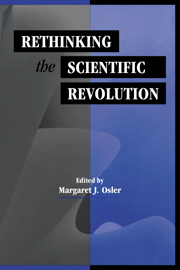Book contents
- Frontmatter
- Contents
- List of Contributors
- Preface
- Introduction
- Part I The Canon in Question
- Part II Canonical Disciplines Re-Formed
- Part III Canonical Figures Reconsidered
- 9 Pursuing Knowledge: Robert Boyle and Isaac Newton
- 10 The Alchemies of Robert Boyle and Isaac Newton: Alternate Approaches and Divergent Deployments
- 11 The Janus Faces of Science in the Seventeenth Century: Athanasius Kircher and Isaac Newton
- 12 The Nature of Newton's “Holy Alliance” between Science and Religion: From the Scientific Revolution to Newton (and Back Again)
- 13 The Fate of the Date: The Theology of Newton's Principia Revisited
- 14 Newton and Spinoza and the Bible Scholarship of the Day
- Part IV The Canon Constructed
- Index
9 - Pursuing Knowledge: Robert Boyle and Isaac Newton
Published online by Cambridge University Press: 25 October 2009
- Frontmatter
- Contents
- List of Contributors
- Preface
- Introduction
- Part I The Canon in Question
- Part II Canonical Disciplines Re-Formed
- Part III Canonical Figures Reconsidered
- 9 Pursuing Knowledge: Robert Boyle and Isaac Newton
- 10 The Alchemies of Robert Boyle and Isaac Newton: Alternate Approaches and Divergent Deployments
- 11 The Janus Faces of Science in the Seventeenth Century: Athanasius Kircher and Isaac Newton
- 12 The Nature of Newton's “Holy Alliance” between Science and Religion: From the Scientific Revolution to Newton (and Back Again)
- 13 The Fate of the Date: The Theology of Newton's Principia Revisited
- 14 Newton and Spinoza and the Bible Scholarship of the Day
- Part IV The Canon Constructed
- Index
Summary
In the past few years both Boyle and Newton have received considerable scholarly attention, and today we know much more about these two paragons of the “Scientific Revolution” than did previous generations of scholars. The “Newtonian Industry,” as Richard S. Westfall has termed it, has undergone a radical transformation in at least two areas. First, the image of Newton as a significant influence in the establishment of Enlightenment deism has been considerably modified by scholars such as James E. Force, Edward B. Davis, and Betty Jo Dobbs, and it is now widely recognized that even though the Newtonian system could be (and indeed was) associated with a deistic world view, this was most definitely not what Newton himself intended. Second, Newton's alchemical pursuits, long kept secret, and even longer misunderstood, have finally been brought to light by J. E. McGuire and P. M. Rattansi, and have been interpreted by Betty Jo Dobbs in such a way that their relationship to Newton's thought as a whole finally makes sense.
Where Boyle studies are concerned, there has been a virtual explosion of activity, due primarily to the efforts of Michael Hunter to make Boyle's unpublished manuscripts and correspondence available to scholars unable to travel to the Royal Society of London, as well as his efforts to establish and maintain a network of communication among the present generation of Boyle scholars. This activity has resulted in a better understanding of all aspects of Boyle studies, including his own alchemical pursuits, his view of the relationships between theology, natural philosophy, and epistemology, and the details of his experimental program.
- Type
- Chapter
- Information
- Rethinking the Scientific Revolution , pp. 183 - 200Publisher: Cambridge University PressPrint publication year: 2000
- 3
- Cited by

